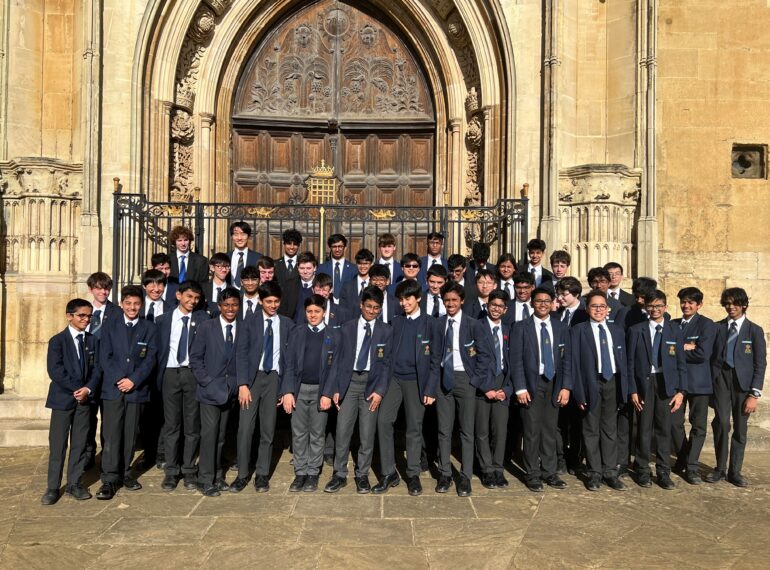
QE’s Chamber Choir relished the opportunity to sing evensong at King’s College Chapel – one of the world’s most famous venues for church choral music.
Singing alongside the King’s Voices – the college’s mixed-voice choir – in only their fourth-ever evensong, the QE boys not only enjoyed the chance to sing in an inspiring setting, but also to sample the life of a university Choral Scholar.
The historic event also proved to be a draw for Old Elizabethans, with two singing with the choir and other alumni joining the congregation.
Headmaster Neil Enright said: “It is a tremendous honour to be invited to sing at King’s College Chapel. This was, therefore, an historic occasion for our School, and one that will live long in the memory.
“I know our boys really enjoyed the chance to sing amid the soaring Gothic architecture of King’s College Chapel. Musically, it was a great success, with the boys attentive and sounding superb in their rendering of Dyson’s Magnificat and Nunc Dimittis in D major and Wood’s choral setting of Bramley’s O Thou the Central Orb.
“It was also a pleasure to see alumni turning out to support the current boys – my colleagues and I enjoyed the opportunity to catch up with them afterwards.”
Renowned for its choral tradition, including its Christmas Eve Festival of Nine Lessons and Carols, which is broadcast worldwide, King’s College Chapel welcomes members of the university, local residents and tourists to its services.
As well as taking part in afternoon rehearsals, the QE Chamber Choir spent time looking around Cambridge, visiting the Sedgwick Museum of Earth Sciences and touring a number of colleges with OEs Raphael Herberg (2015–2022) and Jao-Yong Tsai (2016–2023), who are studying Music at Cambridge and who rejoined QE’s choir for the occasion.
At St John’s College, they had a Q and A session with the current Director of Music, Christopher Gray, where the boys found out more about choral scholarships and asked questions about the application process.
For the evensong back at King’s College, the Chamber Choir were directed by the Interim Assistant Director of Music, Ralph Woodward, who is also the current Director of King’s Voices.
Music teacher Rebecca German said: “We were extremely fortunate to be given the chance to sing evensong at King’s College Chapel; it gave the boys a taster of what life would be like as an Oxbridge Choral Scholar. We hope that a large number of them will go on to apply in the future.”
Current Year 13 student Arjun Patel has won a Choral Scholarship from Merton College, Oxford.
Hovan Sarkissian, of Year 8, said: “It was greatly enjoyable to explore the beautiful sights of Cambridge with my fellow choir members. Even so, nothing could top the truly unforgettable experience of singing with my peers and the King’s College Chapel Choir in such a historic and remarkable place.”
- Click on the thumbnails below to view more photos.

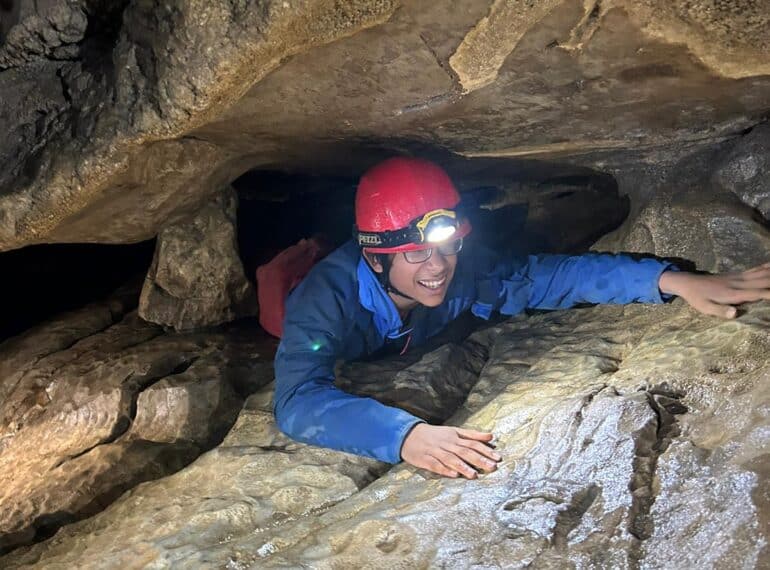
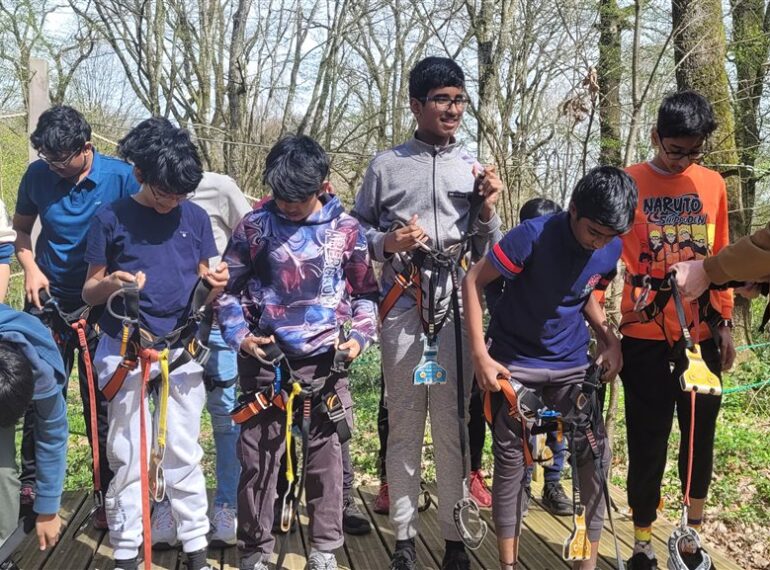
 The group were kept busy with a host of activities during their stay with pupils from QE’s partner school, Collège St Pierre, from the town of Bourg en Bresse, between Lyon and Geneva.
The group were kept busy with a host of activities during their stay with pupils from QE’s partner school, Collège St Pierre, from the town of Bourg en Bresse, between Lyon and Geneva.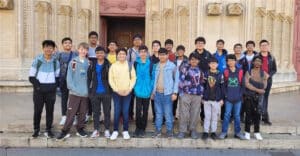 By spending evenings and the weekend of the trip with families, the QE boys were able to build their confidence in French, as well as experiencing a different way of life.
By spending evenings and the weekend of the trip with families, the QE boys were able to build their confidence in French, as well as experiencing a different way of life. The official programme also included:
The official programme also included: Noah’s fellow member of Underne form, Harsh Chavda, said: “I particularly enjoyed going to the market on the last day because it is rare to find such markets here in London. There were so many different shops – selling cheese, olives, bread, desserts, Chinese food, clothes and so much more! Some of us asked the owner of the cheese store to give us his strongest cheese, and we all tasted some. It was so strong and for me, disgusting!
Noah’s fellow member of Underne form, Harsh Chavda, said: “I particularly enjoyed going to the market on the last day because it is rare to find such markets here in London. There were so many different shops – selling cheese, olives, bread, desserts, Chinese food, clothes and so much more! Some of us asked the owner of the cheese store to give us his strongest cheese, and we all tasted some. It was so strong and for me, disgusting!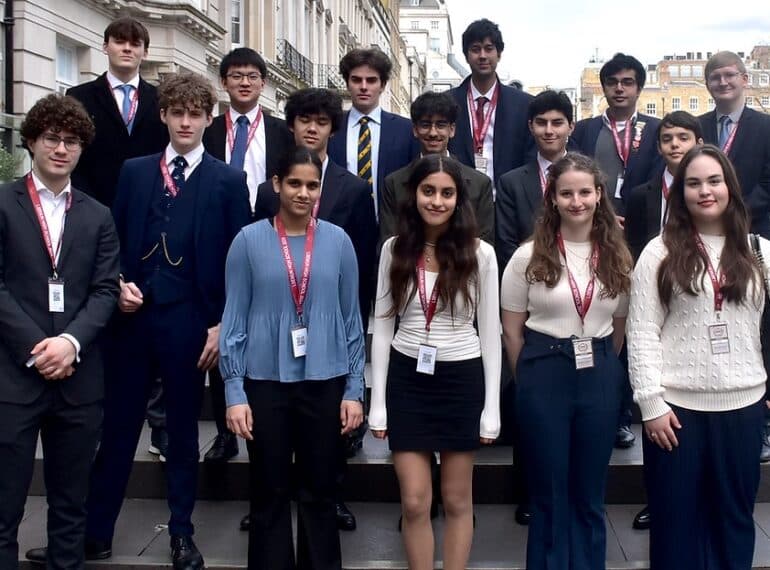
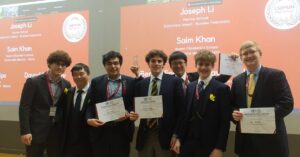 Saim Khan and Chanakya Seetharam were part of a nine-strong group from QE’s Year 12 who took part in the three-day debating event, which simulated the activities of the UN.
Saim Khan and Chanakya Seetharam were part of a nine-strong group from QE’s Year 12 who took part in the three-day debating event, which simulated the activities of the UN.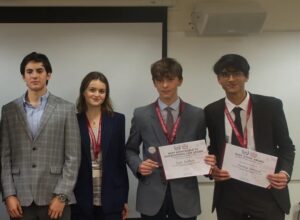 The QE delegates were split among the various committees, including the Security Council. They debated a wide range of topics, including both current conflicts and those of the past, such as the 1956-1957 Suez Crisis.
The QE delegates were split among the various committees, including the Security Council. They debated a wide range of topics, including both current conflicts and those of the past, such as the 1956-1957 Suez Crisis.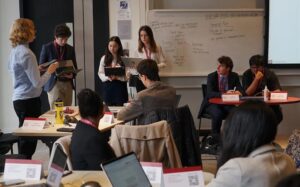 Saim relished his own role representing Malta (“not necessarily the world’s most geopolitically dominant nation”) at MUN. “Whilst I had to work much harder to establish my initial credibility and convince other delegates that the Maltese were even worth listening to, by the end of the three days I can confidently say that Malta had become the leader of the free world.”
Saim relished his own role representing Malta (“not necessarily the world’s most geopolitically dominant nation”) at MUN. “Whilst I had to work much harder to establish my initial credibility and convince other delegates that the Maltese were even worth listening to, by the end of the three days I can confidently say that Malta had become the leader of the free world.”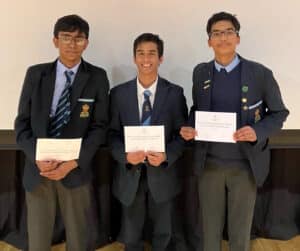 While the group were disappointed to miss out on the award for best medium-sized delegation (which went to Eton), they were, said Uday Dash, “extremely grateful to the conference for providing us with a platform to discuss real socio-economic and political matters that drastically affect our world today”.
While the group were disappointed to miss out on the award for best medium-sized delegation (which went to Eton), they were, said Uday Dash, “extremely grateful to the conference for providing us with a platform to discuss real socio-economic and political matters that drastically affect our world today”.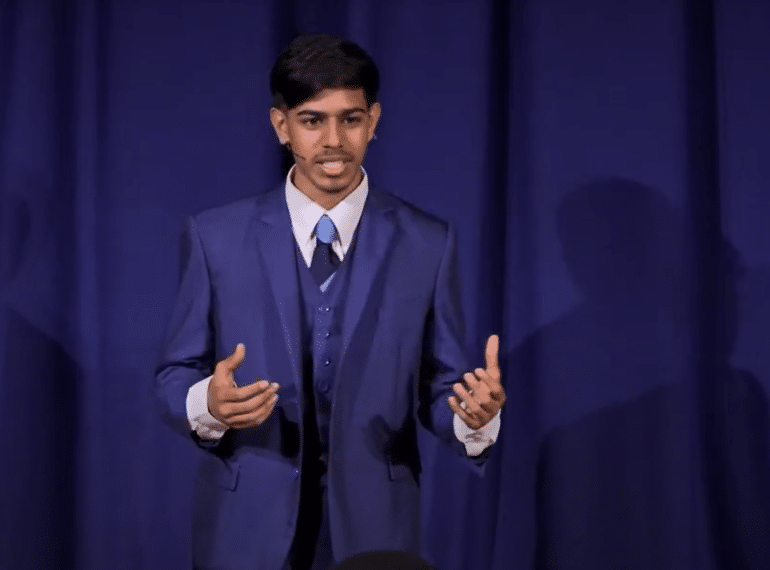
 He beat more than 400 entrants – and 11 other finalists – to triumph in the Gresham Oracy Competition run by Gresham College, London’s oldest higher education institute.
He beat more than 400 entrants – and 11 other finalists – to triumph in the Gresham Oracy Competition run by Gresham College, London’s oldest higher education institute. He began his presentation with the poetic account of human origins in the book of Genesis – “And so God created mankind in his own image, in the image of God he created them, male and female he created them,” continuing “And yet science endeavours to go one step further, to defy imperfection, to alleviate prodigious amounts of suffering, and to alter the very make-up of you and me.”
He began his presentation with the poetic account of human origins in the book of Genesis – “And so God created mankind in his own image, in the image of God he created them, male and female he created them,” continuing “And yet science endeavours to go one step further, to defy imperfection, to alleviate prodigious amounts of suffering, and to alter the very make-up of you and me.”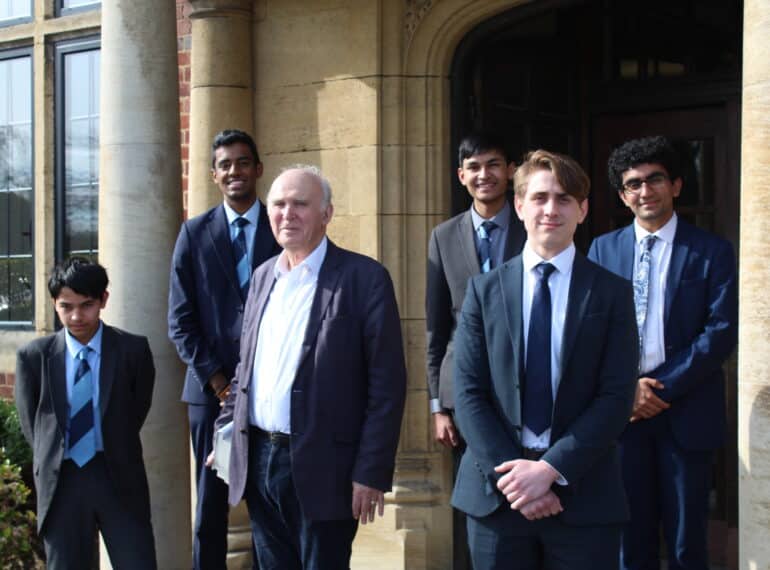
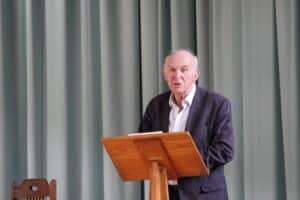 His afternoon visit to QE was led by the society’s Rishabh Bhatt, of Year 12. Before taking questions from an audience drawn from all year groups in the Main School Hall, he gave some brief advice to any aspiring politicians. They should understand the importance of:
His afternoon visit to QE was led by the society’s Rishabh Bhatt, of Year 12. Before taking questions from an audience drawn from all year groups in the Main School Hall, he gave some brief advice to any aspiring politicians. They should understand the importance of: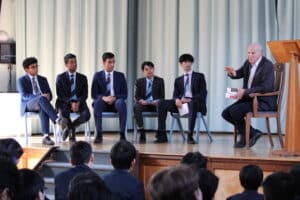 Assessing how the General Election may go overall, he said that a Labour government seems the most likely at present, but that it was entirely possible that it would not have the big majority that some, taking their cue from opinion polls, are assuming.
Assessing how the General Election may go overall, he said that a Labour government seems the most likely at present, but that it was entirely possible that it would not have the big majority that some, taking their cue from opinion polls, are assuming.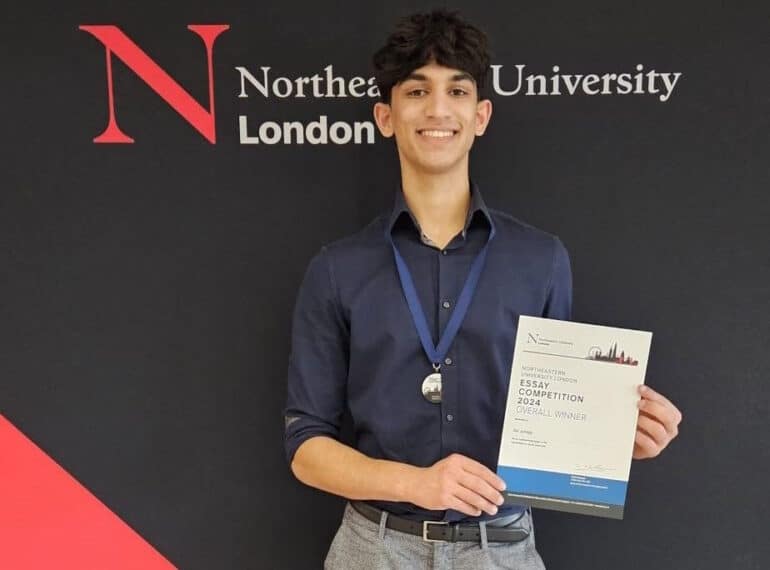
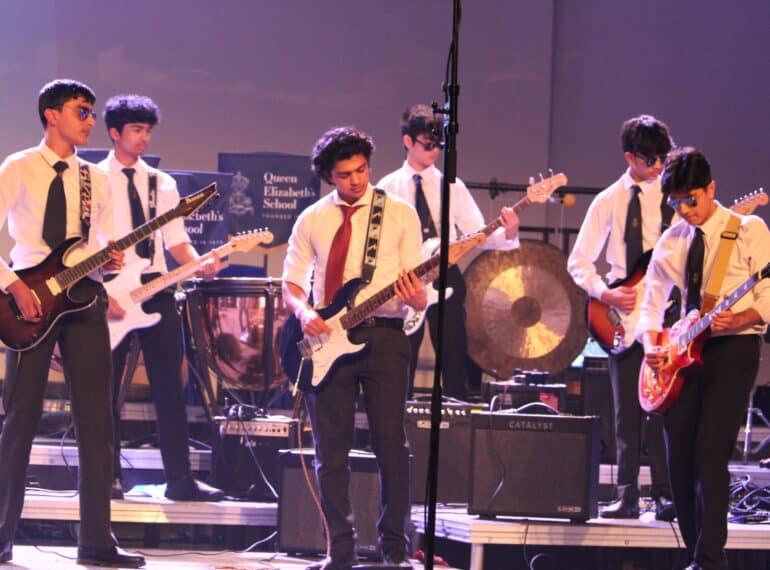
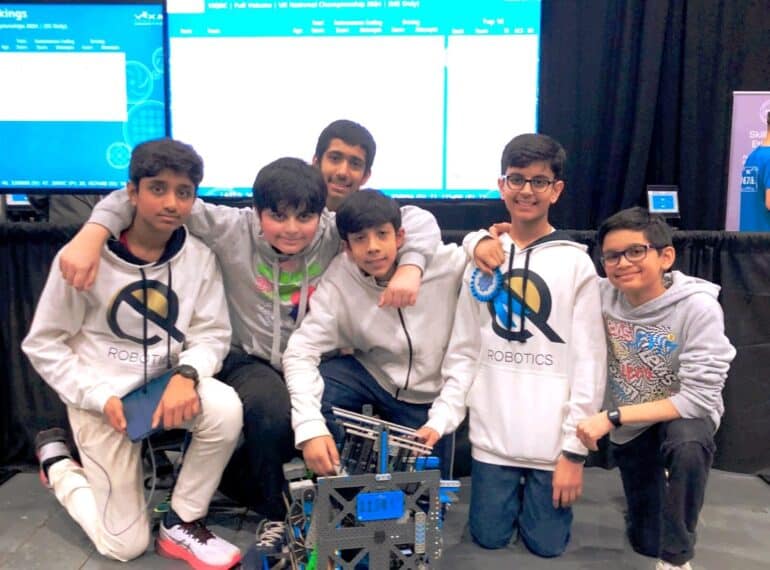
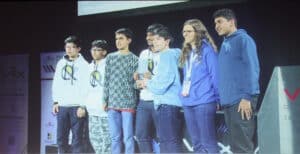 Teams Gearsquad, Constellation and CircuitBreakers will be heading for the States at the end of this month, having maintained strong performances at the national championships in Telford.
Teams Gearsquad, Constellation and CircuitBreakers will be heading for the States at the end of this month, having maintained strong performances at the national championships in Telford.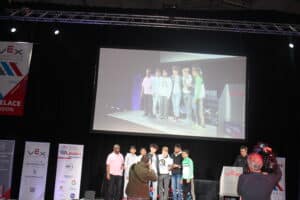 The three 2024 qualifiers sealed their qualification at the recent UK national championships, in which all 11 QE robotics teams took part.
The three 2024 qualifiers sealed their qualification at the recent UK national championships, in which all 11 QE robotics teams took part. “QE performed well, ranking 25th and 26th in their divisions of 60-plus teams and both successfully being selected at Alliance Selection, being unfortunate to be knocked out at the round of 16, “said Mr Noonan. “Students loved the experience, despite the cold temperatures, particularly commenting on the beauty of Calgary.”
“QE performed well, ranking 25th and 26th in their divisions of 60-plus teams and both successfully being selected at Alliance Selection, being unfortunate to be knocked out at the round of 16, “said Mr Noonan. “Students loved the experience, despite the cold temperatures, particularly commenting on the beauty of Calgary.”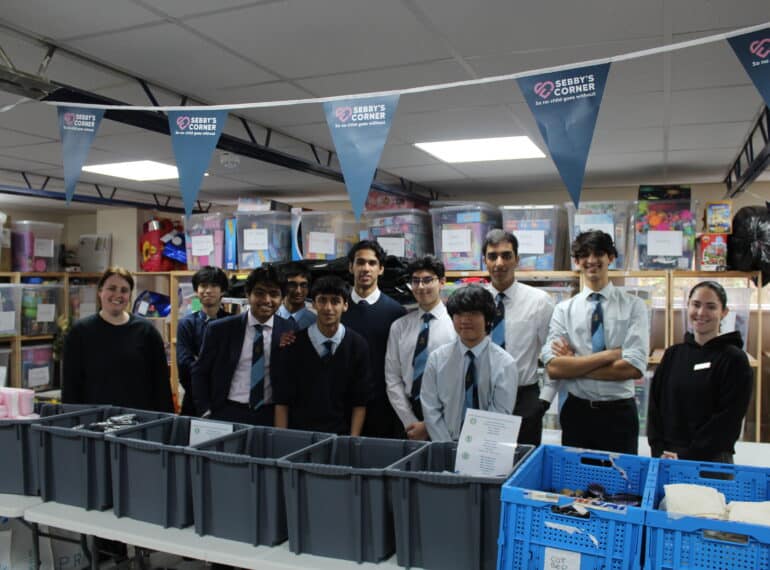
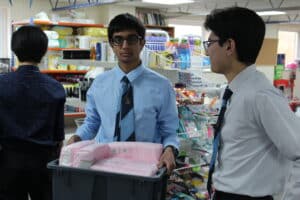 The Year 12 House Captains and Deputy House Captains got to work on a ‘packathon’ organised by Sebby’s Corner, which offers support to families across Barnet, Hertfordshire and London.
The Year 12 House Captains and Deputy House Captains got to work on a ‘packathon’ organised by Sebby’s Corner, which offers support to families across Barnet, Hertfordshire and London.